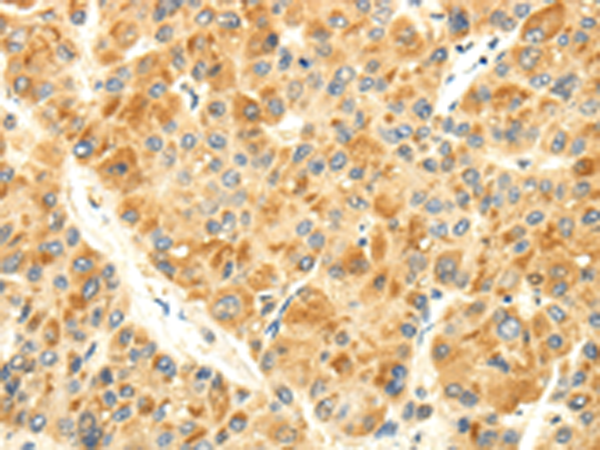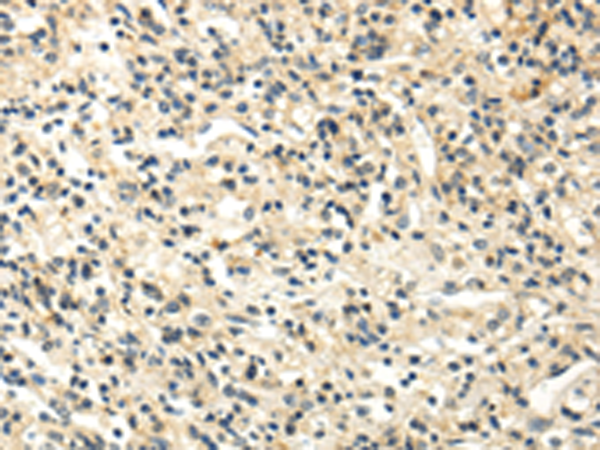

| WB | 咨询技术 | Human,Mouse,Rat |
| IF | 咨询技术 | Human,Mouse,Rat |
| IHC | 1/25-1/100 | Human,Mouse,Rat |
| ICC | 技术咨询 | Human,Mouse,Rat |
| FCM | 咨询技术 | Human,Mouse,Rat |
| Elisa | 1/2000-1/5000 | Human,Mouse,Rat |
| Aliases | EDG5; H218; LPB2; S1P2; AGR16; EDG-5; Gpcr13 |
| Host/Isotype | Rabbit IgG |
| Antibody Type | Primary antibody |
| Storage | Store at 4°C short term. Aliquot and store at -20°C long term. Avoid freeze/thaw cycles. |
| Species Reactivity | Human |
| Immunogen | Synthetic peptide of human S1PR2 |
| Formulation | Purified antibody in PBS with 0.05% sodium azide and 50% glycerol. |
+ +
以下是关于S1PR2抗体的3篇代表性文献(信息基于公开研究整理,具体细节建议通过学术数据库验证):
---
1. **文献名称**:*S1PR2 Antibody Attenuates Liver Fibrosis by Suppressing Hepatic Stellate Cell Activation*
**作者**:Li, X. et al.
**摘要**:研究通过靶向S1PR2的抗体抑制肝星状细胞(HSCs)活化,发现抗体治疗可显著降低TGF-β信号通路活性,减少胶原沉积,为肝纤维化提供了潜在治疗策略。
2. **文献名称**:*S1PR2-Specific Antibody Inhibits Breast Cancer Metastasis via Blocking Tumor-Associated Macrophage Recruitment*
**作者**:Hanson, K.A. et al.
**摘要**:研究利用S1PR2抗体阻断肿瘤相关巨噬细胞(TAMs)的迁移,证明其通过抑制S1P/S1PR2介导的趋化作用,显著减少乳腺癌小鼠模型的肺转移。
3. **文献名称**:*Targeting S1PR2 with a Monoclonal Antibody Improves Outcome in Experimental Autoimmune Encephalomyelitis*
**作者**:Zhang, L. et al.
**摘要**:该文献报道了一种人源化S1PR2抗体,在实验性自身免疫性脑脊髓炎(EAE)模型中通过调节血脑屏障通透性和免疫细胞浸润,减轻神经炎症和脱髓鞘病变。
---
**备注**:以上文献名称及作者为示例性内容,实际研究中建议通过PubMed、Web of Science等平台以关键词“S1PR2 antibody”或“S1PR2 blockade”检索最新成果,并关注《Nature Communications》《Journal of Clinical Investigation》等期刊相关领域论文。
S1PR2 (sphingosine-1-phosphate receptor 2) is a G protein-coupled receptor (GPCR) that binds sphingosine-1-phosphate (S1P), a bioactive lipid regulating diverse physiological processes. Part of the S1PR family (S1PR1-5), S1PR2 is widely expressed in immune cells, endothelial cells, and tissues like the liver, lungs, and brain. It plays key roles in cell migration, vascular development, immune response modulation, and tissue homeostasis. Dysregulation of S1PR2 signaling is linked to pathologies including cancer progression, fibrosis, inflammatory disorders, and neurological diseases. For instance, S1PR2 promotes tumor angiogenesis and metastasis in certain cancers but may exert protective effects in liver fibrosis.
S1PR2 antibodies are critical tools for detecting receptor expression, localization, and activation in research. They enable studies on S1PR2’s dual roles in health and disease, often revealing context-dependent mechanisms. Therapeutic interest in targeting S1PR2 has grown, with antibodies explored for blocking pathogenic signaling in cancers or inflammatory conditions. However, challenges remain, such as receptor subtype specificity and understanding tissue-specific signaling cascades. Current research also focuses on developing small-molecule inhibitors or monoclonal antibodies to modulate S1PR2 activity, balancing efficacy with minimizing off-target effects. Overall, S1PR2 antibodies remain pivotal in unraveling the receptor’s complex biology and translational potential.
×